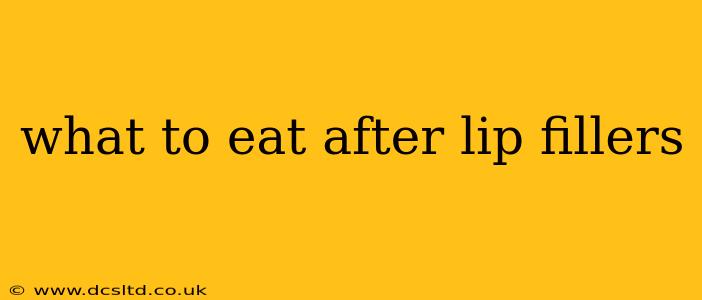Getting lip fillers is a popular cosmetic procedure, but knowing what to eat afterward is crucial for minimizing swelling, bruising, and promoting faster healing. This guide will delve into the best and worst foods to consume post-lip filler treatment, ensuring you achieve the best possible results.
What to Eat After Lip Fillers to Reduce Swelling?
Immediately following your lip filler procedure, your practitioner will likely advise you on specific aftercare instructions. However, a diet rich in anti-inflammatory foods is generally recommended to reduce swelling and bruising. This includes:
-
Fruits and Vegetables: These are packed with antioxidants and vitamins that support healing. Think blueberries, strawberries, spinach, kale, and bell peppers. Their high water content also contributes to hydration, which aids in reducing swelling.
-
Lean Protein: Protein is essential for tissue repair. Include lean sources like chicken breast, fish, turkey, and beans in your diet.
-
Omega-3 Fatty Acids: These healthy fats have anti-inflammatory properties. Good sources include fatty fish (salmon, tuna, mackerel), flaxseeds, and chia seeds.
-
Ginger: Known for its anti-inflammatory properties, ginger can be consumed in various forms – tea, supplements, or even added to your meals.
What Foods Should You Avoid After Lip Fillers?
Certain foods can hinder the healing process and potentially increase swelling and bruising. It's best to avoid these in the days following your treatment:
-
Salty Foods: Salt can retain water, leading to increased swelling. Limit your intake of processed foods, salty snacks, and heavily salted dishes.
-
Spicy Foods: Spicy foods can irritate the injection sites and cause discomfort.
-
Alcohol: Alcohol is a blood thinner and can increase bruising and swelling. It's best to abstain from alcohol for at least 24-48 hours after your procedure.
-
Caffeine: Similar to alcohol, caffeine can also act as a blood thinner, so it's wise to limit your intake of coffee and caffeinated beverages.
How Long Should I Maintain This Diet After Lip Fillers?
The duration you should maintain this diet depends on your individual healing response and your practitioner’s recommendations. Generally, it's advisable to follow these dietary guidelines for at least the first 24-48 hours, and potentially longer if you experience significant swelling or bruising. As your lips heal, you can gradually reintroduce foods you avoided, but it's wise to continue prioritizing anti-inflammatory foods for optimal results.
What About Supplements? Are There Any That Help?
While a balanced diet is key, some supplements may support healing. Arnica is a common herbal remedy that's often recommended for reducing bruising. However, it’s crucial to consult your doctor or practitioner before taking any supplements, as they can interact with medications or have potential side effects.
Can I Drink Plenty of Water After Lip Fillers?
Yes! Hydration is essential for the healing process. Drinking plenty of water helps flush out toxins and reduces swelling. Aim for at least eight glasses of water per day.
What if I Experience Significant Swelling or Bruising?
If you experience excessive swelling or bruising, contact your practitioner immediately. They can assess the situation and provide guidance on appropriate aftercare.
In Conclusion:
Following a healthy diet after lip fillers can significantly contribute to a smoother recovery and better results. Prioritizing anti-inflammatory foods and avoiding those that could potentially increase swelling or bruising will help you achieve your desired outcome. Remember to always follow your practitioner's specific aftercare instructions for the best possible results.
